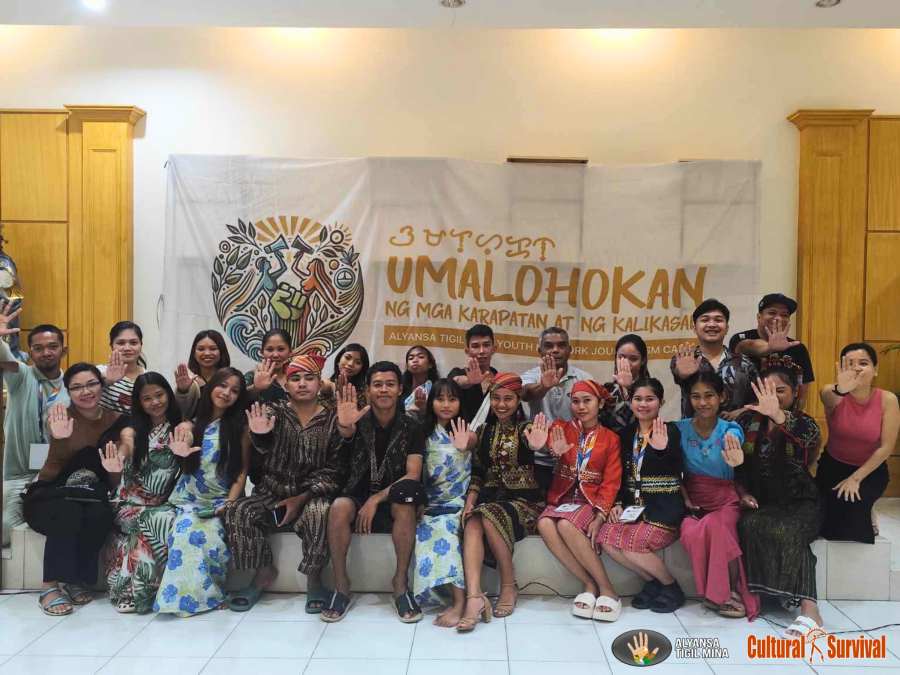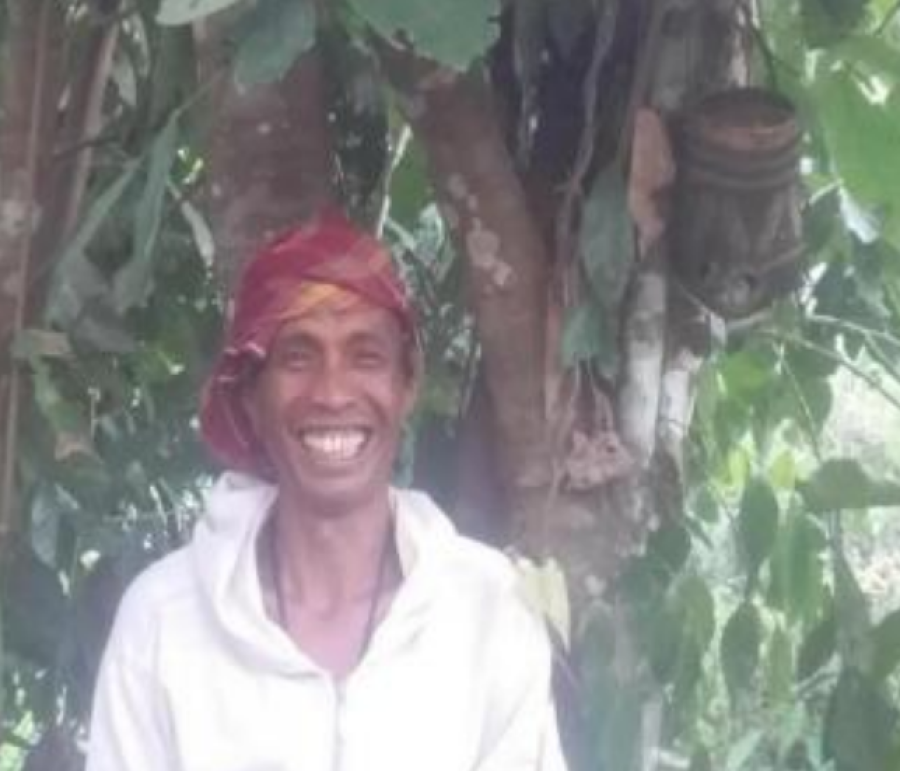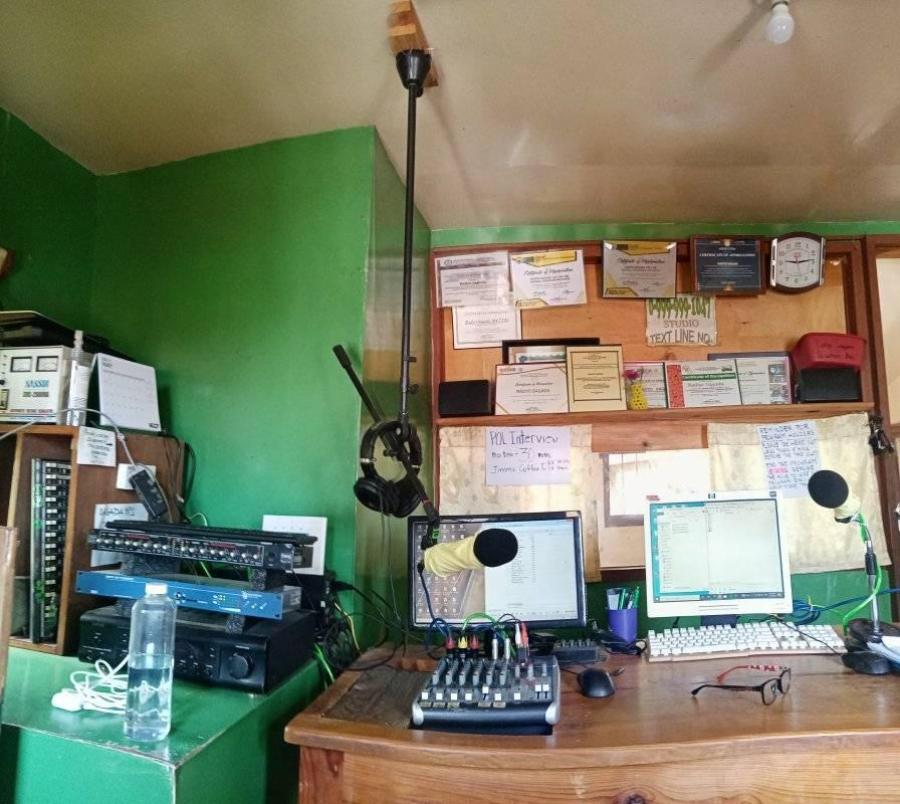
Securing Indigenous Land Titles
The Coalition Against Land Grabbing (CALG) is an Indigenous-led organization based in Palawan province in the Philippines. The organization serves and is run by members of the three main Indigenous communities living in Palawan, the Pala’wan, Tagabanua, and Batak. The Coalition Against Land Grabbing has been working on its mission to secure land, forest, and natural resources for the local Indigenous communities since 2014 in order to oppose the massive, on-going land grabbing taking place in the region. With a Cultural Survival’s Keepers of the Earth Fund grant, the Coalition worked with local communities to protect their resources from agribusiness corporations and other forms of land grabbing.
The Coalition used the funds to advocate against agribusiness companies that are trying to implement development projects on Indigenous ancestral land, petitioning a silica mining company, and facilitating requests for ancestral domain titles (CADT) procedures and preparing Ancestral Domain Sustainable Development and Protection Plans in some communities.
In 2016, two major agribusiness companies, the Green Power Palawan Agriculture Corporation (GPPAC) and Lionheart Agrotech, started to clear land in the ancestral domain of the Pala’wan of Barangay Ransang without adhering to the proper Free, Prior, and Informed Consent practices. The companies were planning to convert the land into coconut plantations. This land borders valuable territories and areas conserved by Indigenous Peoples and local communities. The Coalition Against Land Grabbing had proven to the National Commission on Indigenous Peoples that the companies did not adhere to proper Free, Prior, and Informed Consent guidelines. As a result, the National Commission on Indigenous Peoples suspended the companies’ Certificate of Precondition. This suspension stopped the companies from continuing to carry out operations.

In response, in June 2017, both companies filed a motion of reconsideration. They requested that the National Commission on Indigenous Peoples lift the suspension and allow the companies to resolve the issue by paying the required bond that is decided by the affected tribes. The Commission decided that the companies should pay the required bond, but it did not allow the companies to resume operations. The companies were requested to submit an Environmental and Socio-Cultural Impact Statement, a comprehensive work plan, and comply with all Free, Prior, and Informed Consent guidelines. The companies suspended operations for a couple of months but soon resumed clearing and even expanding planting operations. About 1000 hectares of Indigenous ancestral domain have been cleared.
The Coalition Against Land Grabbing documented an encroachment by migrants in the areas claimed by Lionheart Agrotech and the areas Lionheart Agrotech would like to expand into. As a result, large areas of land have had the natural vegetation removed, and roads have been built illegally by Lionheart Agrotech that has caused erosion and the destruction of Indigenous burial sites. The company’s encroachment has also caused negative effects on the environment and internal community cohesion in some areas. One lowland Pala’wan from Ransang stated, “Before the companies came to our land, the communities were united, we helped each other in case of need, we exchanged food with each other, no one was left alone. Now brothers are against their own brothers, cousins against cousins, relatives against their own relatives. Trustworthiness and reciprocity have all been affected. This is because companies have divided people’s hearts, they hired some people and left others with no jobs, they paid some people and gave nothing to others, and they created inequalities and injustices. This is why community unity has been lost.”
Recently, Lionheart Agrotech entered into a joint venture agreement with the Department of Environment and Natural Resources for a project without the Free, Prior, and Informed Consent of the affected Indigenous Peoples. The Coalition Against Land Grabbing facilitated a number of meetings with relevant government authorities. Such meetings highlighted that the agreement did not have legal merit due to a lack of Free, Prior, and Informed Consent of the affected communities. Regardless, due to the obstacles of corruption and intragovernmental collusion, the matter remains unresolved. A complaint was made to the Department of Environment and Natural Resources, but there was no response. The Coalition, pending approval from its attorneys, plans to aid the affected Indigenous communities in filing another complaint and will monitor any response.
As Lionheart Agrotech has begun to try and comply with Free, Prior, and Informed Consent practices, the Coalition is concerned such practices will not be conducted in a transparent manner. There have also been a number of instances in the past in which the company has used intimidations and harassment.

The Coalition is supporting the Barangay Capitan of Ransang in monitoring the activities of Lionheart Agrotech. The elected Indigenous Peoples’ Mandatory Representative is also working with the Coalition by sending frequent updates on the situation. The Coalition is also trying to legally support seven Indigenous leaders during court trial because they participated in the destruction and removal of a fence placed on their ancestral domain by Lionheart Agrotech.
On November 25 and 27, 2019, the National Commission for Indigenous Peoples, the Department of Environment and Natural Resources, and Indigenous representatives met to discuss the Lionheart Agrotech case. The Coalition Against Land Grabbing provided funds for the Palawan delegation for transportation, accommodations, and food. The Palawan delegation was also able to visit the National Commission for Indigenous Peoples’ regional office and meet with the Enbanc Chairperson. At the meeting, a number of issues including the transparency and legality of Lionheart Agrotech’s Free, Prior, and Informed Consent practices and the joint venture agreement were discussed. The Chairperson assured the delegation that the joint venture agreement will be classified as void, and advised them to wait for the Free, Prior, and Informed Consent procedures to be finished before calling for a dialogue to challenge it.
An upland Pala’wan from Ransang stated, “Everybody comes to our land with a purpose. The oil palm companies say that they want to make us rich, the mining companies say they will build hospitals for us, the environmentalists claim that they want to save animals and plants in our forest, the missionaries want to save our souls. The government tells us that if we stop our upland farming they will give us livelihood alternatives. Everybody comes here with a plan, but no one asks us what is our plan and our vision for our land and our people.”
In the Municipality of Rizal, the Coalition was also able to assist the Indigenous communities in submitting a petition against a silica mining company that would impact Indigenous land. In a parallel effort, the Coalition also worked on an education and information campaign in various communities to inform them about the long-term impact of mining and share the experiences of communities that have been impacted by mining.
In Ransang, Candawaga, and Culasian, the Coalition also has successfully implemented requests for ancestral domain title procedures (CADT) processes. A CADT data gathering and census project is near completion. The Coalition has also accomplished an Ancestral Domain Sustainable Development and Protection Plan and has sent a letter to the National Commission on Indigenous Peoples for its validation.
The National Commission on Indigenous Peoples should be releasing a memorandum of agreement to be signed by the Indigenous representatives of the area soon. This is a key step in the CADT process, but other steps must be taken in order to accomplish the demarcation and recognition of ancestral territories.
Going forward, the Coalition Against Land Grabbing is facing a new challenge. The provincial government of Palawan passed a resolution that supports the passage of a law that declares certain areas of land of the public domain in Palawan as alienable and disposable and open to distribution for agricultural, commercial, residential, industrial, and other productive purposes. The areas of land in question include areas of land in which CADT is being applied. The Coalition will challenge this resolution by highlighting that Indigenous ancestral domains can not be converted into alienable and disposable land and that the communities must be consulted in regard to any development plans for the land.

The Coalition and the Indigenous people of Palawan have been facing a number of other obstacles from the federal government. Under the administration of President Duterte, there has been a deterioration of democracy and human rights that has impacted the Indigenous Peoples of Palawan. The Coalition staff has experienced death-threats and are in increased danger. Major constitutional changes proposed by the president could cancel the Indigenous Peoples’ Rights Act, which is the cornerstone for the work being done by the Coalition. Furthermore, some activities by the Coalition had to be put on hold due to an election ban from September 2018 - June 2019.
The Coalition Against Land Grabbing and the Indigenous Peoples of Palawan are working tirelessly to protect their ancestral territories for future generations. The issues they are battling are continuously changing and the Coalition continues to monitor and respond to developments of the situation as they arise in creative and strategic ways. One Pala’wan from Candawage stated, “If our land is not spared from destruction, time will come that we will have to cross mountains and rivers to find medicinal plants, perhaps we will have to reach the other side of the island, just to discover that no matter how far we walk, the animals are gone, the forest is gone, the food is gone.”



